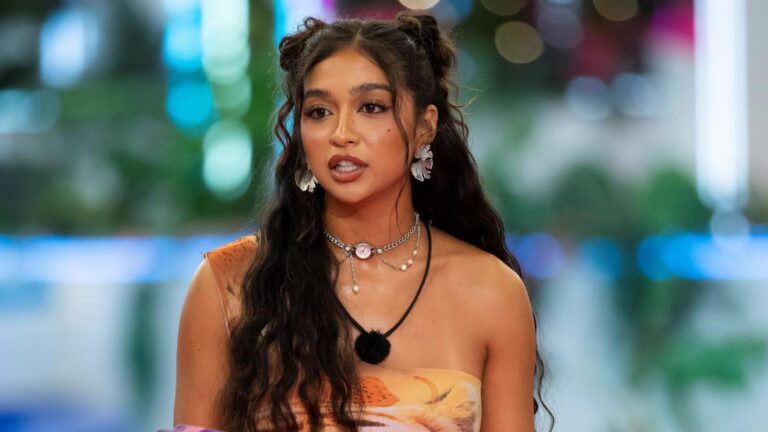Cierra Ortega has exited the ŌĆ£Love Island USAŌĆØ villa amid controversy sparked by resurfaced social media posts containing racial slurs. The reality TV starŌĆÖs departure comes after a wave of backlash from fans and critics, prompting the showŌĆÖs producers to take swift action. This development has reignited discussions about accountability and the consequences of past online behavior in the realm of reality television.
Cierra Ortega Leaves Love Island USA Amid Controversy Over Past Racial Slur Posts
Cierra OrtegaŌĆÖs abrupt departure from “Love Island USA” stirred a wave of discussions across social media platforms after past social media posts containing racial slurs resurfaced. Following the public backlash, the show’s producers released a statement expressing their commitment to maintaining an inclusive environment, which ultimately led to Ortega’s exit. Her decision to leave the villa came amid growing pressure from fans and fellow contestants, reflecting a zero-tolerance stance on offensive language and behavior.
- Apology Issued: Ortega posted a public apology, acknowledging her past mistakes and expressing regret for the harm caused.
- Show’s Response: Executives stated the importance of accountability and outlined steps to prevent similar incidents.
- Audience Reaction: Fans were divided, with some calling for forgiveness, while others demanded stricter consequences.
| Aspect | Details |
|---|---|
| Incident | Resurfaced racially offensive posts |
| Immediate Action | Voluntary exit from the villa |
| Producers’ Statement | Commitment to diversity and inclusion |
Impact of Social Media Backlash on Reality TV Participants and Show Reputation
Reality TV stars often face intense scrutiny when past behaviors or statements resurface, significantly impacting both their careers and the shows they appear on. Cierra Ortega’s recent departure from the ŌĆśLove Island USAŌĆÖ villa is a prime example of how social media backlash can prompt swift exits. The backlash stemmed from resurfaced posts containing racial slurs, triggering widespread condemnation from viewers and industry insiders alike. This not only pressures participants to address their past but also forces production companies to make rapid damage control decisions to protect the showŌĆÖs integrity and public image.
The ripple effects go beyond the individuals involved, affecting the overall reputation of the reality program. Shows like ŌĆśLove Island USAŌĆÖ must navigate a delicate balance between showcasing diverse personalities and managing the fallout when controversial content emerges. Networks often implement:
- Stricter background checks on contestantsŌĆÖ social media history
- Damage control strategies, including public apologies and participant removals
- Enhanced PR campaigns to rebuild audience trust and engagement
These measures highlight the growing influence of social media in shaping the trajectories of reality television and underscore the importance of accountability in the digital era.
| Impact Area | Effect on Participants | Effect on Show |
|---|---|---|
| Public Backlash | Career setbacks and removal from show | Negative publicity and ratings risk |
| Brand Image | Damaged personal reputation | Need for rebranding and audience engagement efforts |
| Network Action | Possible contract termination | Implementation of preventive measures |
Producers and Network Respond to Allegations and Contestant Removal
Following the resurfacing of controversial posts containing racial slurs attributed to Cierra Ortega, producers and Love Island USA’s network swiftly addressed the situation. In a joint statement, the production company emphasized their commitment to fostering a respectful and inclusive environment, affirming that they do not condone any form of discrimination or offensive behavior. The network expressed remorse over the negative impact the incident had on the cast, crew, and viewers, stating that they took immediate action by removing Ortega from the villa to maintain the show’s integrity.
The response also outlined the steps being taken to ensure accountability and to prevent similar issues in future seasons:
- Enhanced background screenings for all contestants prior to joining the show.
- Mandatory sensitivity training to promote cultural awareness among participants and staff.
- Open communication channels for viewers and cast members to report concerns promptly.
The Importance of Accountability and Social Media Vetting in Reality Television Casting
In the wake of Cierra OrtegaŌĆÖs departure from the Love Island USA villa following the resurfacing of racial slur posts, the entertainment industry is once again spotlighting the critical need for stringent accountability measures during the casting process of reality television. Producers are being urged to intensify their social media vetting to prevent individuals with controversial or offensive histories from entering the public eye on high-profile platforms. This incident underscores how past online behavior can severely impact not only the reputation of the talent involved but also the credibility of the show itself.
Key considerations going forward include:
- Comprehensive background checks: Implementing deeper investigations into social media histories to identify potential red flags.
- Transparent policies: Establishing clear guidelines for acceptable behavior both on and off-screen.
- Swift response mechanisms: Developing action plans to address controversies promptly when they arise.
| Aspect | Benefit |
|---|---|
| Social Media Vetting | Protects show integrity and audience trust |
| Accountability Frameworks | Ensures ethical standards are upheld |
| Transparent Communication | Improves public relations and viewer loyalty |
To Wrap It Up
As the conversation around accountability and social media conduct continues to evolve, Cierra OrtegaŌĆÖs departure from the “Love Island USA” villa highlights the complexities faced by reality television in addressing past controversies. The show’s producers have yet to comment on the future implications for casting policies, while viewers remain divided on the incident. This development underscores the growing scrutiny of public figuresŌĆÖ online histories and their impact on personal and professional reputations in the digital age.







